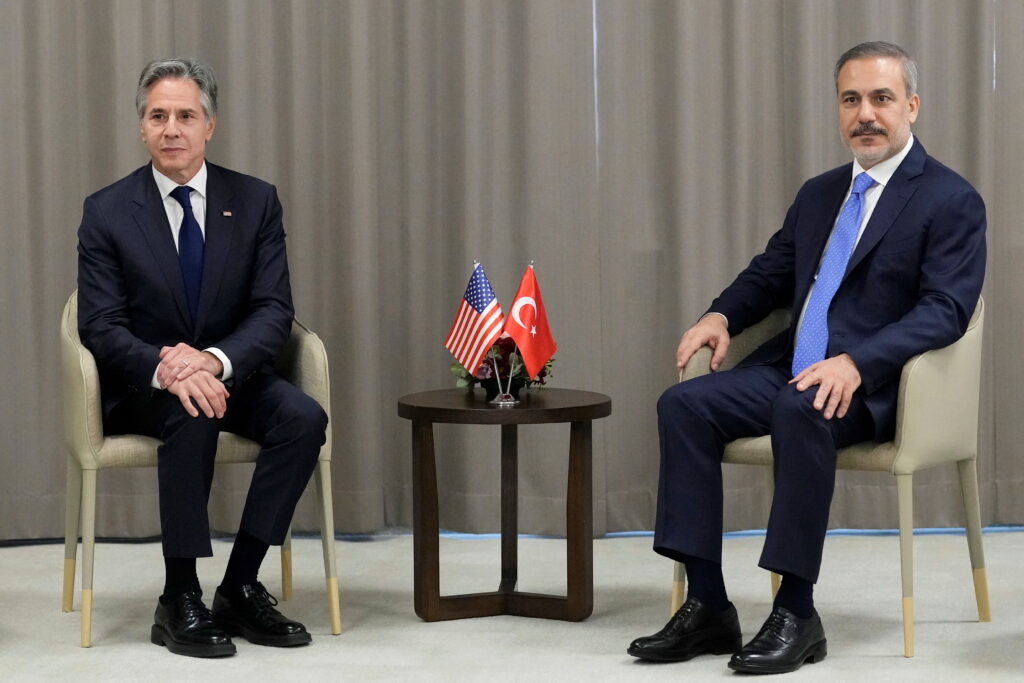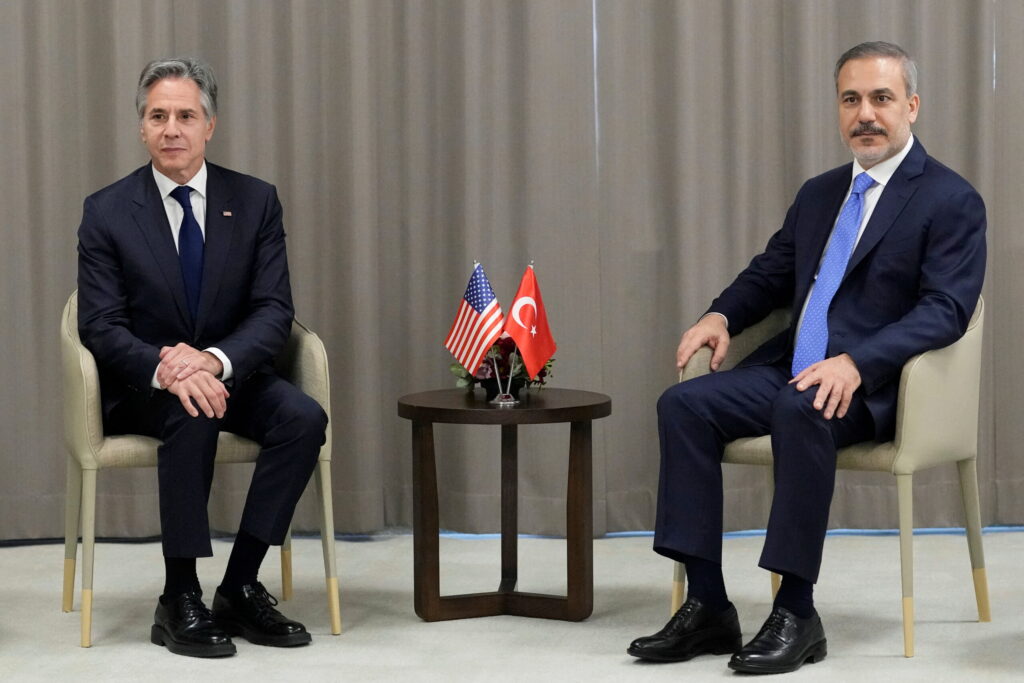
From July 9-11, the United States will host the NATO summit in Washington, marking 75 years of NATO, described as the world’s “most successful military alliance.” The summit marks a significant milestone in NATO’s history and an opportunity for senior officials to discuss the future of the alliance and strengthen defense and deterrence in the most dangerous security environment since the Cold War.
Participants in the summit will include Turkish President Recep Tayyip Erdogan. Since joining NATO in 1952, Turkey has contributed significantly to NATO activities around the world to protect itself and NATO’s southeastern flank from the Soviet threat. Today, as NATO’s second largest military and gatekeeper of the straits connecting the Black Sea and the Mediterranean Sea, Turkey plays a vital role in European stability and security. However, the complexity of relations between Ankara and Washington and the lack of dialogue between the allies have often overshadowed the success of the transatlantic partnership and limited opportunities for cooperation.
US Ambassador to Turkey Jeff Flake recently said the NATO summit would be an opportunity for a meeting between Erdogan and US President Joe Biden, saying “there is hope on both sides.” However, it is unclear whether the meeting will materialize. Erdogan’s visit to the White House in May was canceled due to scheduling issues cited by both sides. Flake said the visit came at a time when the Gaza crisis presented a “difficult political backdrop.”
Despite this backdrop, Biden and Erdogan should not squander the opportunity to meet again, as closer cooperation would bring a range of geopolitical, economic and security benefits.
Why timing matters
The meeting is significant: Biden has met Erdogan in person only twice during his presidency, both times on the sidelines of international summits. Erdogan is due to visit Washington for the NATO summit, shortly after meeting with Russian President Putin at the Shanghai Cooperation Organization summit in Kazakhstan and just weeks after Turkish Foreign Minister Hakan Fidan said Turkey was interested in joining the group of developing countries known to China as BRICS.
Russia has loved using any opportunity to widen the rift between Turkey and other NATO allies, so it is not surprising that the Kremlin was quick to welcome Turkey’s desire to join the BRICS. In contrast to the warm welcome from the Russian and Chinese leaders, a cold response from Biden would only intensify Turkey’s quest for what it sees as a fair multipolar world and its feelings of being alienated from both the European Union and the United States. Erdogan’s perception in the West as an unwelcome guest would further exacerbate the wall of distrust between Ankara and Washington.
Positive winds of change
The major breakthroughs in the F-16 deal, the successful accession process of Sweden and Finland to NATO, and the expansion of U.S.-Turkish cooperation in joint military production have a positive impact on both regional security and Turkey’s relations with the West. For example, when the Department of Defense embarked on the renovation of its munitions factories, several such factories in Texas collaborated with the Turkish company Repcon for the design and installation of machinery. Flake estimates that about 30% of the 155mm projectiles produced in the United States will be produced in these factories, boosting military production and helping Ukraine. Moreover, this effort strengthens the strategic relationship between the United States and Turkey and shows Europe that expanding cooperation with Turkey will help strengthen its defense capabilities.
Both the United States and Turkey stand to gain greatly, geopolitically and economically, from a revitalized relationship. “Turkey is at the center of too many conflicts globally for the United States to delay a renewed dialogue,” said Asli Aydintasbas of the European Council on Foreign Relations. Russia’s invasion of Ukraine, the war in Gaza, geopolitical realignments in the South Caucasus, and the rise of the Russia-Iran-China alliance have further strained Turkey’s already central role in NATO.
Meanwhile, Turkey may gain immediate benefits from trade and energy cooperation with Russia, but it must understand that its economic and security interests are inextricably linked to the West, not to authoritarian regimes such as China or Russia. Doing business with a sanctioned, unstable and undemocratic country is a major geopolitical risk and carries huge economic costs. The Russian economy has become a war economy, and doing business with Moscow does not have much of a future, especially with secondary sanctions looming. For many years, Germany and the United States have held leading positions as Turkey’s largest export partners, and while joining BRICS may help Turkey strike a balance between the West and the Global South, it is unlikely to help sustain Turkey’s economic growth in the long run. This economic pragmatism, combined with new geopolitical realities, should provide a solid foundation for reinvigorating the transatlantic partnership.
To engage with Türkiye, make it part of your plan
The Black Sea could be a test of revitalized cooperation between Turkey and the West, as it represents a near convergence of the NATO allies’ key interests in the region: restoring Ukraine’s territorial integrity and freedom of navigation, containing Russia, balancing Russian-Iranian relations, and promoting energy diversification. While the region remains sensitive to fluctuations in U.S.-Turkish relations, it also offers opportunities to improve transatlantic ties and jointly defend the region, especially in maritime security.
Turkey has close cooperation with Black Sea NATO members Romania and Bulgaria and has been a vocal supporter of Ukraine and Georgia’s NATO membership. Ukraine’s recent success in weakening Russia’s naval power and tipping the balance of maritime power in Turkey’s favor makes Kiev a natural ally for Turkey as both countries seek to counter Russian dominance in the Black Sea. This strategic connection through Kiev could solidify Turkey’s tilt toward the West.
Closer maritime cooperation among Turkey, Romania and Bulgaria, and potentially with Ukraine, would help deny Russia the ability to conduct provocations and false flag operations in its territorial waters and exclusive economic zones and protect its assets deployed in the northwestern Black Sea. This is particularly important as both Turkey and Romania are working to develop their offshore gas fields, Sakarya and Neptune Deep. Successful development of these reserves would reduce the region’s dependence on Russian fossil fuels and weaken Moscow’s energy strategy in the region, so we can expect the Kremlin to employ a variety of hybrid tactics to block the implementation of these offshore energy projects.
Romania and Bulgaria lack naval capabilities and therefore need to strengthen cooperation with Turkey to protect their critical infrastructure. For example, now that the Black Sea Mine Countermeasures Task Force, launched in January 2024 as a tripartite effort by Bulgaria, Romania and Turkey to remove floating mines in their territorial waters, is operational, the task force should become a permanent patrol mission to ensure the security of sea lanes and maritime trade and curb Russian illicit activities in the Black Sea.
Turkey, Romania, Bulgaria and Ukraine are working together to bolster defense and deterrence in the Black Sea region, and Biden and Erdogan are likely to discuss a number of topics at the NATO summit, including how the United States and other European allies can increase support for those efforts.
While the Montreux Convention limits the ability of non-littoral states to build up naval power in the Black Sea, the United States and its European allies can strengthen NATO’s defense and deterrence in the region by strengthening coastal states’ air defense and intelligence, surveillance, and reconnaissance capabilities, supporting defense industrial projects, and deploying additional coastal defense, anti-ship, anti-submarine, and electronic warfare systems on NATO’s eastern flank. Turkey can play a central role in strengthening NATO’s sea denial capabilities to ensure the security of Black Sea port infrastructure and sea lanes.
The key to enabling cooperation with the US and our European allies is to start with dialogue.
As the United States works on a new Black Sea strategy and prepares an agenda for the NATO summit in which regional security issues will dominate, the time has come to include regional leader Turkey in its plans. Against the backdrop of continued Russian aggression in Ukraine and growing Iranian and Chinese involvement in the Black Sea, strengthened cooperation between Turkey, Ukraine and the West is crucial for the security of Europe and the resilience of these countries’ democracies.
Evgenia Gaber is an adjunct senior fellow at the Atlantic Council on Turkey and a professor at the George C. Marshall Center for European Security Studies. Follow her on Twitter: https://twitter.com/EvgeniaGaber Gabel Evgenia.
The views expressed here are those of the authors and do not reflect the official policy or position of the George C. Marshall Center for European Security Studies, the U.S. Department of Defense, or the U.S. Government.
This blog is part of a joint research project between Turkey’s Atlantic Council and the Center for Applied Turkish Studies titled “Ocean of Opportunities: Can Western Countries Benefit from Turkey’s Autonomous Foreign Policy in the Black Sea?”. The study sheds light on Turkey’s regional leadership aspirations and identifies possible avenues of cooperation between Ankara and its Western allies in the Black Sea region, including defense and military cooperation, political and diplomatic dialogue, and maritime and energy security.
References
Image: US Secretary of State Antony Blinken meets with Turkish Foreign Minister Hakan Fidan in Prague, Czech Republic, May 30, 2024. Petr David Josek/Pool via Reuters


